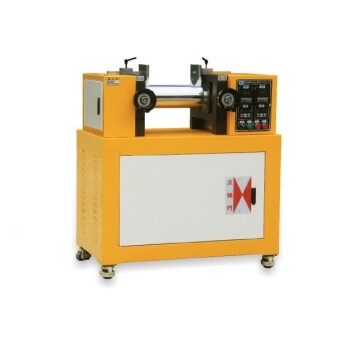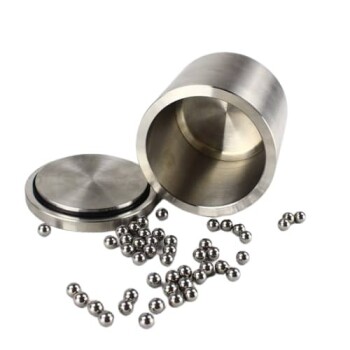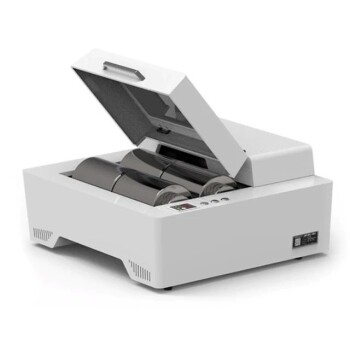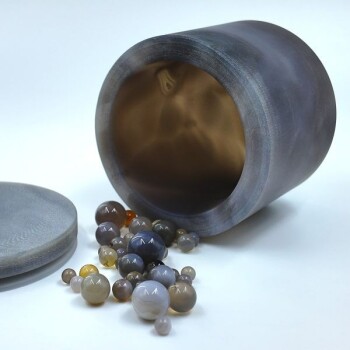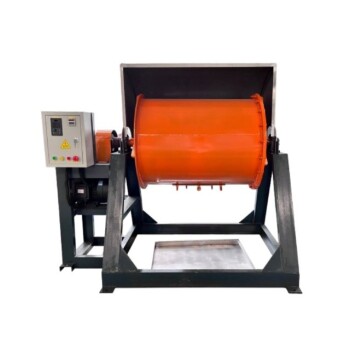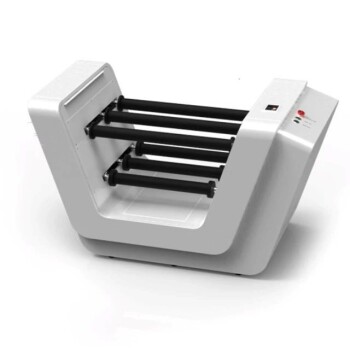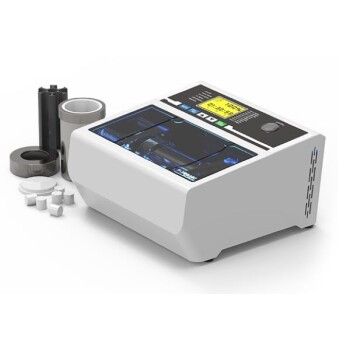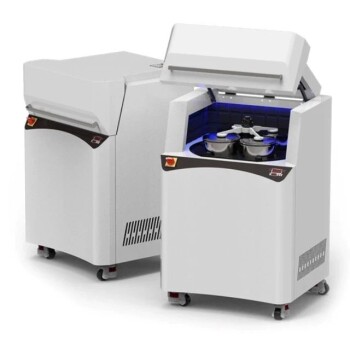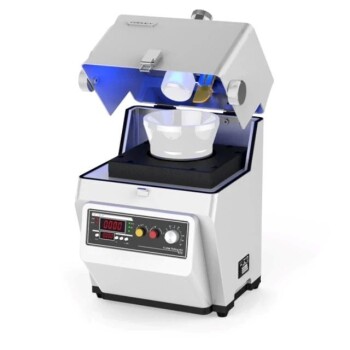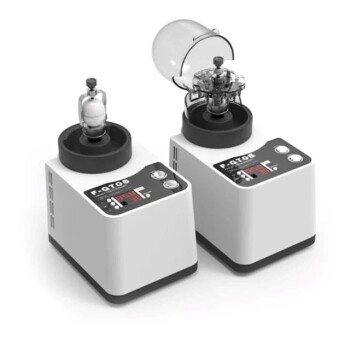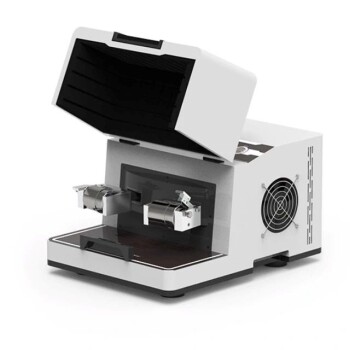At its core, a rubber mixing mill is a machine used to manufacture rubber compounds. It takes raw, base rubber and thoroughly combines it with a variety of additives to create a new, homogenous material with specific, desired properties. This process is the foundation for producing nearly all modern rubber products.
The true function of a mixing mill goes beyond simple mixing. It uses intense mechanical shear and friction to fundamentally change the rubber's molecular structure, breaking it down to make it workable (a process called mastication) and then uniformly dispersing additives to create a consistent, high-performance compound.
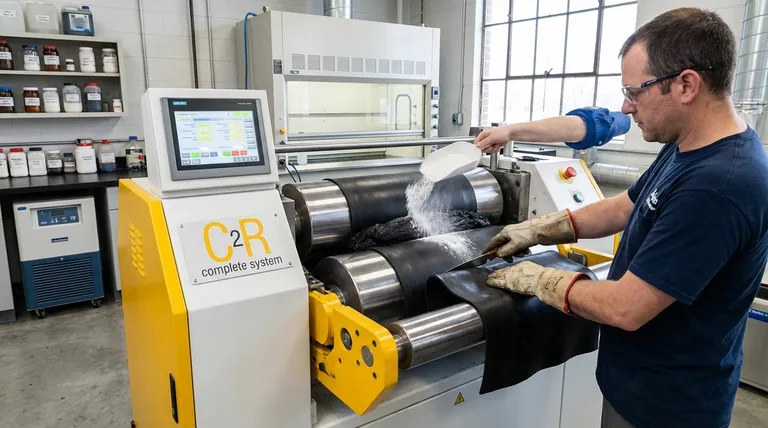
How a Mixing Mill Fundamentally Transforms Rubber
A mixing mill, also known as a two-roll mill, doesn't just stir ingredients together. It performs a sequence of mechanical and thermal processes that are critical for creating a usable rubber compound from its raw components.
The Core Mechanism: Counter-Rotating Rolls
The machine's design is straightforward but highly effective. It consists of two large, horizontal steel rolls positioned side-by-side.
These rolls rotate towards each other at slightly different speeds. This speed differential creates an area of intense shear and friction in the narrow gap, or "nip," between them.
Step 1: Mastication and Plasticization
The process begins with mastication. Raw natural or synthetic rubber is tough, elastic, and difficult to work with. When fed into the mill, the immense shearing force tears and breaks down the long, entangled polymer chains of the rubber.
This mechanical breakdown, aided by the heat generated from friction, reduces the rubber's viscosity and elasticity. It becomes softer, more pliable, and "plastic-like," making it receptive to the addition of other ingredients.
Step 2: Incorporation and Dispersion of Additives
Once the rubber is plasticized, the operator introduces additives. These are not simply poured in but are carefully fed into the rolling bank of material on the mill.
Common additives include:
- Fillers (like carbon black or silica) to add strength and durability.
- Softeners and Plasticizers (like oils) to improve flexibility.
- Curing Agents (like sulfur) that will later be used to vulcanize the rubber.
- Accelerators and Activators to control the speed of the final curing process.
- Colorants for aesthetic purposes.
The continuous shearing and folding action of the mill ensures these ingredients are not just mixed, but are dispersed uniformly on a microscopic level throughout the rubber matrix. This creates a true compound where every part has the same properties.
Understanding the Trade-offs and Limitations
While foundational to the rubber industry, the two-roll mill is a manually intensive process with specific challenges that require expertise to manage.
Operator Skill is Paramount
A mixing mill is not an automated machine. It requires a highly skilled operator to "work" the material by cutting the rubber sheet from the roll, folding it, and feeding it back into the nip. This ensures all parts of the batch are processed evenly. The quality of the final compound is directly tied to the operator's experience and technique.
Batch-to-Batch Consistency
Achieving identical properties from one batch to the next can be a challenge. It relies on precise control over mixing time, temperature, the order of ingredient addition, and the operator's actions. For high-volume applications where consistency is critical, manufacturers often use automated internal mixers (like a Banbury mixer) for the primary compounding step.
Significant Safety Risks
The open, rotating rolls present a major safety hazard. Modern mills are equipped with extensive safety features like emergency stop bars, cradles, and electronic braking systems, but strict operational procedures and training are non-negotiable to prevent serious injury.
Making the Right Choice for Your Goal
The two-roll mill remains a vital tool, but its best application depends on your specific manufacturing or development objective.
- If your primary focus is versatility and custom compounds: The open mill is unparalleled for its flexibility, allowing for rapid formula changes and direct visual inspection of the compound during mixing, making it ideal for smaller batches and specialty products.
- If your primary focus is lab-scale development and testing: A small-scale laboratory two-roll mill is an indispensable tool for creating test batches, evaluating new additives, and establishing the processing parameters for a new rubber compound.
- If your primary focus is high-volume, repeatable production: An internal mixer is typically more efficient and provides better batch-to-batch consistency, though a mixing mill is often still used downstream to cool the compound and shape it into sheets for further processing.
Ultimately, mastering the principles of the rubber mixing mill is fundamental to understanding how raw materials are transformed into finished rubber goods.
Summary Table:
| Key Function | Description |
|---|---|
| Mastication | Breaks down tough, raw rubber polymer chains to make it pliable and workable. |
| Incorporation | Mixes in additives like fillers, curing agents, and plasticizers. |
| Dispersion | Ensures uniform, microscopic distribution of additives for a consistent compound. |
| Key Application | Best Suited For |
| :--- | :--- |
| R&D & Lab Testing | Creating small test batches and developing new formulas. |
| Specialty Production | Manufacturing custom or low-volume rubber compounds with high flexibility. |
Ready to Master Your Rubber Compounding Process?
Whether you're developing new materials in the lab or scaling up production, the right equipment is critical for achieving consistent, high-quality results. KINTEK specializes in providing reliable lab equipment and consumables, including robust rubber mixing mills designed for precision and durability.
Our experts can help you select the perfect mill for your specific application, ensuring you get the performance and flexibility you need to innovate and excel.
Contact KINTELK today to discuss your laboratory equipment needs and discover how our solutions can enhance your rubber compounding workflow.
Visual Guide

Related Products
- Open Type Two Roll Mixing Mill Machine for Rubber Crusher
- Laboratory Single Horizontal Jar Mill
- Laboratory Ball Mill Jar Mill with Metal Alloy Grinding Jar and Balls
- Laboratory Four-Body Horizontal Jar Mill
- Laboratory Jar Mill with Agate Grinding Jar and Balls
People Also Ask
- What are the disadvantages of screw extrusion? High Costs and Complexity Explained
- How to mix rubber compounds? Choosing Between Open Mill and Internal Mixer
- What is the injection molding process step by step? A Guide to High-Volume Manufacturing
- What are the different types of rubber mixing? Choose the Right Method for Your Production Scale
- What is the significance of compression set? Predict Material Failure and Ensure Long-Term Reliability
- Is co-extrusion the same as dual extrusion? Unlock the Power of Multi-Material Plastic Profiles
- What is a vulcanizing press? Essential Tool for Rubber Manufacturing and Tire Production
- What are the two common types of injection molding processes? Thermoplastic vs. Thermoset Explained
